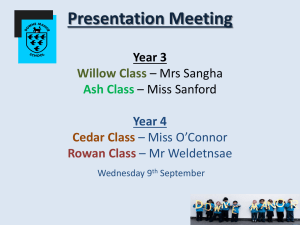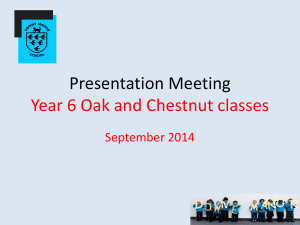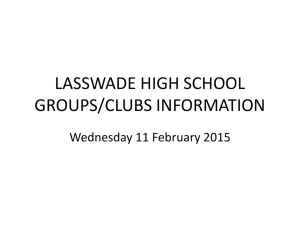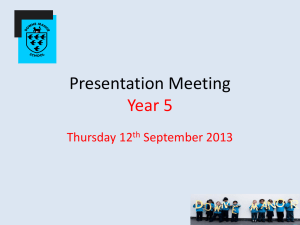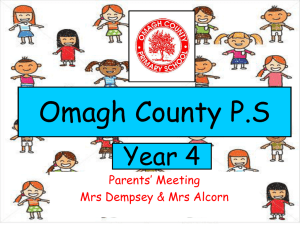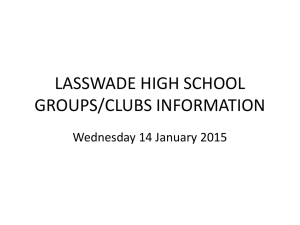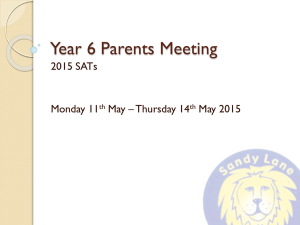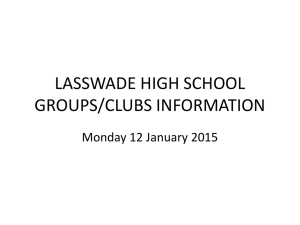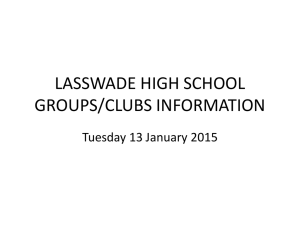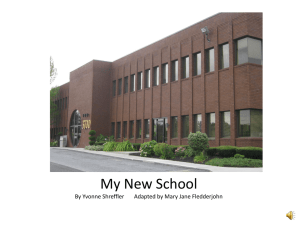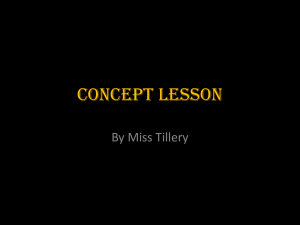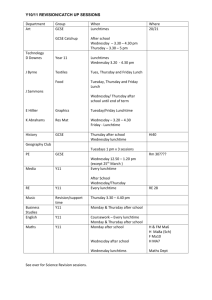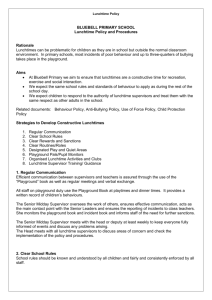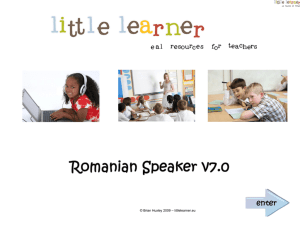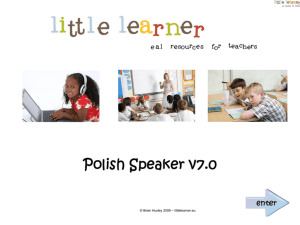Presentation Meeting - years 3 & 4
advertisement
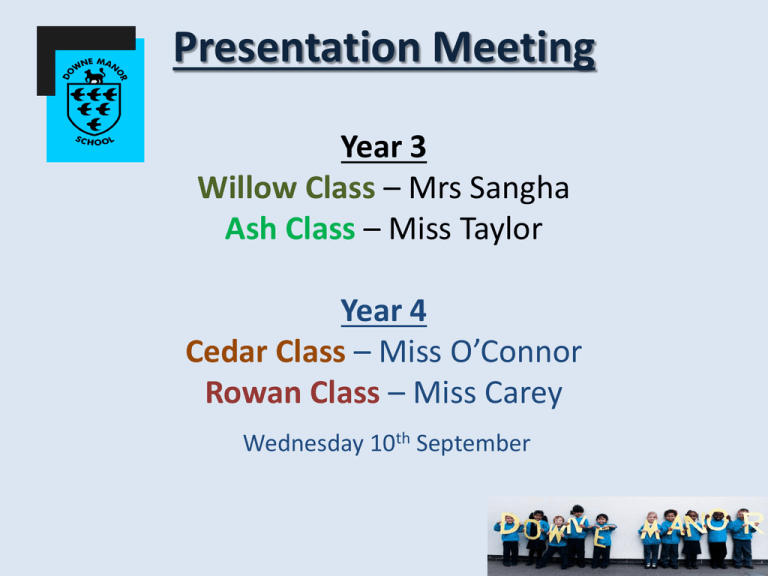
Presentation Meeting Year 3 Willow Class – Mrs Sangha Ash Class – Miss Taylor Year 4 Cedar Class – Miss O’Connor Rowan Class – Miss Carey Wednesday 10th September Year 3 & 4 Staff Team • Classteachers • Teaching Assistants/Learning support teachers: -Mrs Daley -Mr Whaley -Miss Banks - Miss Manjdadria -Mrs McQueen • Miss Buton – French teacher • PE Teacher – Mr Amorim • Mr Moloi- Assistant Headteacher-KS 2 leader A day at school • Literacy and Numeracy taught in the morning starting at 8:50am • Break time – 10:20am – 10:35pm • Lunchtime – 12:10pm – 1:10pm • PPA cover – French and outdoor PE lessons • ICT will be once a week. • P.E days • • Indoor – Willow & Ash Thursday afternoon – Cedar & Rowan-Friday afternoon Outdoor – Willow & Ash Friday afternoon – Cedar & Rowan- Tuesday afternoon English Transcription • Develop understanding of writing concepts by: • Extending the range of sentences with more than one clause by using a wider range of conjunctions, including when, if, because, although. • Using the present perfect form of verbs in contrast to the past tense. • Choosing nouns or pronouns appropriately for clarity and cohesion and to avoid repetition. Handwriting • Join letters, deciding which letters are best left un-joined. • Make handwriting legible by ensuring downstrokes of letters are parallel and letters are spaced appropriately. Composition • Write for a wide range of purposes using the main features identified in reading. • Use techniques used by authors to create characters and settings. • Compose and rehearse sentences orally. • Plan, write, edit and improve. Vocabulary, Grammar and Punctuation • Use and understand grammatical terminology when discussing writing and reading: Year 3 • word family, conjunction, adverb, preposition, direct speech, inverted commas (or ‘speech marks’), prefix, consonant, vowel, clause, subordinate clause. Year 4 • pronoun, possessive pronoun, adverbial. Word Reading • Apply a growing knowledge of root words, prefixes and suffixes (etymology and morphology). • Read further exception words, noting the spellings. Comprehension • Draw inferences from reading. • Predict from details stated and implied. • Discuss words and phrases that capture the imagination. • • Retrieve and record information from non-fiction, using titles, headings, sub-headings and indexes. Prepare poems and plays to read aloud with expression, volume, tone and intonation English Reading at home helps children understand texts with meaning and develops their vocabulary and imagination. Spelling homework will be on Monday and children must memorise them and then transfer them into their writing. Guided reading will take place four times a week. The teacher will sit with one group whilst the rest of the class will do a variety of language based activities. Maths • • • • • • • • • Number, place value and rounding Addition and Subtraction Multiplication and Division Fractions (including decimals, percentages, ratio, proportion and probability) Properties of shapes Position, direction and movement Measures Statistics Algebra (Year 6 only) Maths passports Maths Maths Maths Maths Topics Year 3 Life, Health & Growth: Science – Plant life and growth & Animal nutrition DT: Healthy Meals English: Adventure & Mystery stories Romans: Writing outcome – Recounts History – Roman Geography – Roman towns in Britain & the long term impact on Britain Art – Mosaics Rainforests: Writing outcome – Authors and Letters Science – Classification of Living things, Effect of environmental change on living things, Adaptation to environments Geography – The Amazon & Brazilian climate zones Art – Brazilian Art & Animal masks DT – Tribal jewellery PSHE – Fair Trade Egyptians: Writing outcome – Information texts, Dialogues & Plays Science – Light & Dark (Egyptian shadow clocks) D&T – Making Shadow Puppets Art – Egyptian Art, Sculptures History – The discovery of Tutankhamun Geography – The River Nile Volcanoes and Earthquakes: Writing outcome – Report Writing Science – Rocks and Soils Geography – Location of volcanoes & Earthquakes, understanding why they occur in these locations History – Pompeii DT – Designing structures to withhold an earthquake Topics Year 4 Invaders & Settlers Myths & Legends Writing outcome: Diary & Invitation writing History: Vikings and Anglo Saxons Geography: Village Settlers Art & D.T: Designing & making Viking & Anglo Saxon artefacts Writing outcome: Write stories that contain mythical, legendary characters. South Africa Writing outcome: Narrative & Biographies Water Writing outcome: Non chronological reports, Explanations & Persuasive writing. Robots Writing outcome: Explanations Foundation Subjects • The foundation subjects we will be teaching this year are: Music, Art, History, Geography, Science, PSHE, R.E., P.E., Computing & Design and Technology • We will be making cross curricular links within the specific topics being taught • We will be organising linked school trips and classroom experiences to enrich the children’s learning Foundation Subject topics Year 3 4 Topic Life, Health and Growth Romans Rainforests Egyptians Volcanoes and Earthquakes Invaders and Settlers South Africa Myths and Legends Water Robots RE PSHE Festivals of Light We’re all stars! Belief & Practice-Christianity Be friendly, be wise Living long, living strong Signs and symbols Daring to be different Special Leaders Dear diary Joining in and joining up Journeys-Pilgrimages It’s our world Prayer, meditation and Say no! cultivating the inner life Money matters Belief & Practice-Hinduism Who likes chocolate? Moral dilemmas People around us Growing up Music African Drumming Pentatonic scale Creating mood Singing games and songs French All about me Games & Songs Celebrations Portraits The Four friends Growing things All aboard Pocket money Tell me a story Our sporting lives Carnival of the animals What’s the weather like? Changes to Special Educational Needs ~ The Special Educational Needs and Disability Code of Practice 0-25 years ~ • Came into effect on 1st September 2014 We have 3 years to make these changes ~ some changes have already happened others will be introduced over time • Person-centred planning : Pupil views of utmost importance • Increased involvement of parents and carers in the decision making process We will be introducing the opportunity for you to meet with the class teacher prior to the ‘Provision Mapping’ meeting to share your views about your child’s needs. This will inform the provision being offered. A second meeting will be arranged to discuss the Provision Map and the provision further. • Continue to have at least 3 meetings per year to discuss your child’s needs and types of provision on offer • Special Educational Needs provision and progress will be commented on in your child’s Annual Report Changes to Special Educational Needs ~ The Special Educational Needs and Disability Code of Practice 0-25 years ~ What are the main differences? Old New Supported ~ Educational Setting 0-25 ~ Birth to Adulthood Levels of support: SA and SA+ SEN support Assess ~ Plan ~ Do ~ Review Statement EHC (Education, Health and Care plan) Personal Budgets SEN categories Cognition and Learning Difficulties Communication and Interaction Needs Behaviour, emotional and social development needs Sensory and/or Physical Needs SEN categories Communication and Interaction Cognition and Learning Social, Mental and Emotional Health NOTE – No behaviour Sensory and /or physical The Local Offer ~ an information directory of education, health and social care services in the local area Changes to Special Educational Needs ~ The Special Educational Needs and Disability Code of Practice 0-25 years ~ • https://www.gov.uk/government/publications/send-guidefor-parents-and-carers • www.parentpartnership.org.uk Ealing ~ The local offer • http://www.ealing.gov.uk/send Home-Learning Homework must be completed in homework books. English & Mathematics will be sent out on Thursday and will be handed in on Tuesday Spellings will be handed out on Monday Please encourage your child to use Mathletics at home on a regular basis. Where possible support your child in their reading and spellings by asking them questions and helping them to revise. Marking Lunchtime Behaviour System • • Yellow card This is a warning. The lunchtime supervisors will write down the child’s name in their book and talk to the child about what rule they have broken. Red card If they break a rule a second time or they do something serious, the child will get a red card. Miss Alison will send a letter to the parent/carer to tell them about the behaviour and the child will have a lunchtime detention the following day with Miss Alison. • If they misbehave again, they will receive another red card. The parent/carer will have to come for a meeting with Mrs Holland and Miss Alison to discuss the behaviour and they will have a lunchtime detention for 2 days. • If your child gets another Red card, it is very serious, they will have a lunchtime detention for 3 days and you will have a meeting with Mrs Holland. The child will go on a ‘report card’ to check their behaviour every play and lunchtime for 10 consecutive days. You will then meet Mrs Holland again to check improvements have been made. At the end of each term the slate is wiped clean and children start each term without a record of detentions or red cards. General Reminders • Please make sure that book bags, PE kits and water bottles are in school every day. • All school clothes and PE kits MUST be labelled, (there is a uniform list on the school website). • Call the office if your child is absent. • No holidays will be authorised in term time.
